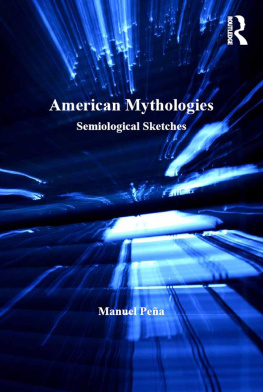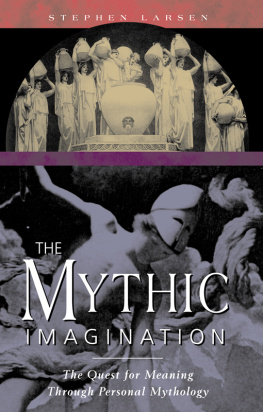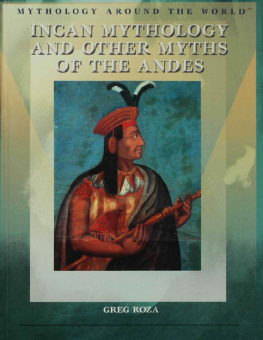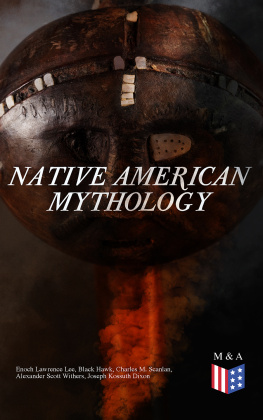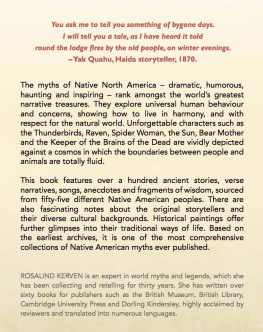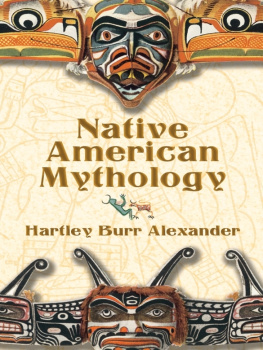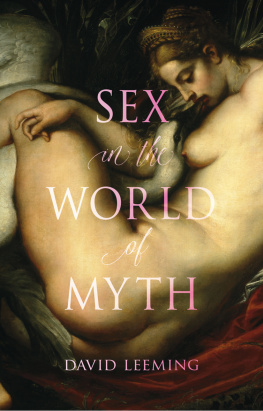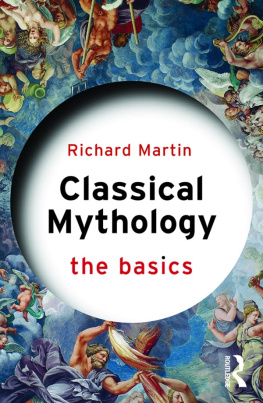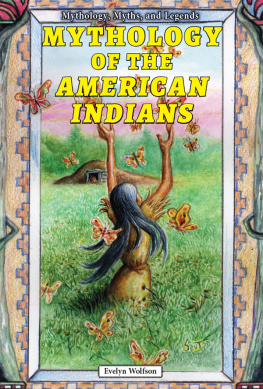AMERICAN MYTHOLOGIES
To point out societys faults is to serve it.
Old Mexican magazine motto
American Mythologies
Semiological Sketches
MANUEL PEA
First published 2012 by Ashgate Publishing
Published 2016 by Routledge
2 Park Square, Milton Park, Abingdon, Oxon OX14 4RN
711 Third Avenue, New York, NY 10017, USA
Routledge is an imprint of the Taylor & Francis Group, an informa business
Copyright 2012 Manuel Pea
Manuel Pea has asserted his right under the Copyright, Designs and Patents Act, 1988, to be identified as the author of this work.
All rights reserved. No part of this book may be reprinted or reproduced or utilised in any form or by any electronic, mechanical, or other means, now known or hereafter invented, including photocopying and recording, or in any information storage or retrieval system, without permission in writing from the publishers.
Notice:
Product or corporate names may be trademarks or registered trademarks, and are used only for identification and explanation without intent to infringe.
British Library Cataloguing in Publication Data
Pea, Manuel.
American mythologies : semiological sketches.
1. Myth--Social aspects--United States. 2. Propaganda, Capitalist--United States. 3. National characteristics, American--Anecdotes. 4. United States--Civilization--Anecdotes. 5. Persuasion (Psychology) 6. United States--Social life and customs--21st century.
I. Title
306.3'0973-dc23
Library of Congress Cataloging-in-Publication Data
Pea, Manuel H., 1942-
American mythologies : semiological sketches / by Manuel Pea.
p. cm.
Includes bibliographical references and index.
ISBN 978-1-4094-4274-5 (hbk)
1. United States--Civilization. 2. Semiotics--United States. 3. Popular culture--United States. 4. National characteristics, American. 5. United States--History--Errors, inventions, etc. I. Title.
E169.12.P46 2011
973--dc23
2011047351
ISBN 9781409442745 (hbk)
ISBN 9781315566689 (ebk)
Contents
List of Figures
Preface
This book was inspired by the example of the French critic Roland Barthes, as he redefined myth in Mythologies, originally published in 1957 and later translated into English in 1972. I was thoroughly impressed by Barthes analysis of contemporary myth as it expressed itself in French culture of the mid-twentieth century. When I read the book in the 1970s, I was convinced its method could fruitfully be applied to the mythologies of America, and I hoped that someday I might replicate the Barthean model to analyze the myths in my own country, the United States. After many detours and years of research and reflection, the present book is the result.
Like Barthes classic, American Mythologies is not intended exclusively as an academic text, although it could be used either as required or supplemental reading material for university-level (including graduate) courses in cultural studies, anthropology, sociology and popular culture. Beyond an academic readership, and given such highly-publicized, myth-generating topics as Obamas death panels, the book aims to attract a wider public, one with the intellectual curiosity to learn something wholly novel about contemporary myths, and how they impact upon so many aspects of American social life. In that universalist spirit, the writing eschews adhering strictly to academic conventions, although, given its theoretical foundation, it must perforce address how the theory works. But except for the introductory chapter, it does this unobtrusively, with a minimum of academic references. Preferring to follow its Barthean model, the book adopts a more personalized writing style, which is laced at times with pointed criticism of the mythical materials discussed. Therein, I hope, lies its appeal to non-academic readers.
A writer never creates a truly original work, and this one is obviously no exception. Besides Barthes, the ideas of multiple writers very much inform the style and spirit of American Mythologies. Many are acknowledged, quoted or referenced in the text, but to them all I dedicate the work. As well, I hazard to guess that most writers also depend on friends and colleagues for guidance as we navigate the treacherous waters of the literary stream. In my case, I wish to express my appreciation to several people who read and critiqued the various chapters. These include Doug Foley, Jerry McMenamin, Dave Quadro, Mario Barrera and Helene Joseph-Weil. My thanks also extend to Paul Andrew Hutton and James Crisp, two experts on the Alamo who critiqued the chapter on the famous landmark. Finally, a tip of the hat to Ron Grimes and Susan Willis, who lent their time to review some of the chapters. To all of these readers I say, muchas gracias, amigos y amigas.
Introduction: American Mythologies
It has been over a half-century since the French cultural critic Roland Barthes defined myth in the contemporary world as a type of speech, or more precisely, as speech stolen and restored elsewhere. Departing from both the anthropological definition of the genre as a type of ancient narrative and the popular one as a baseless story, Barthes turned to semiology and demonstrated in his landmark, Myth Today (Mythologies [1957]), that modern myth is in fact a type of displaced speech. Using this germinal definition, Barthes turned to everyday communicative events to demonstrate his new approach. From the proletarian world of Parisian wrestling to Greta Garbos face, Barthes used his sweeping new theory to deconstruct and reveal the deeper and more elusive significance of such public forms of discourse. But no one followed in Barthes footstepsat least not with respect to myth as a properly defined, discrete category of culture. This book is an attempt to expand the niche Barthes carved out for myth, applying his semiological method to a selection from the mythology of America.
Myth and Signs
As a semiologist, Barthes treated myth as a system of cultural signs, but to understand his usage, we must first provide at least a brief description of what constitutes a cultural sign and how it links up with meaning.American considered a true semiotician, offered this definition of a sign: A sign is something by knowing which we know something else. A bit later, he amplifies the definition: A sign is something which stands to somebody for something in some respect or capacity (quoted in Morris 1971: 338). In American culture a relatively unambiguous example of this definition is the octagonal shape with the letters S-T-O-P that is posted at many street intersections. Motorists know what it signifies and in most instances they act accordingly. But the relationship between the octagonal shape with the lettering on it and the concept behind itits command to automobile driversis a little more complicated than it appears at first blush.
In order to grasp precisely how we learn to interpret the octagonal shape, and how cultural meaning is created generally, we need to explore the relationship between several significant units, or word-signs (monemes), themselves fundamental to semiology. The basic monemes are: sign, signifier, and conceptthe latter often used interchangeably with [the] signified. These and other related terms (for example, symbol, signal) are not necessarily used in the same way by all semioticians, but our models for this exercise are Saussure and Barthes, and so we shall conform to those semiologists usage. We may begin with concept, since the activity this word-sign references is so fundamental to human communication. A product of the ample cerebral cortex humans possess, cognitive activitythinkingis basic for our survival. And cognitive activity involves conceptualizing, or engaging in thought and its articulation via speech, images, sounds, etc. so as to make sense of the physical world around us, and, most important, to navigate the webs of signification that we ourselves create.

